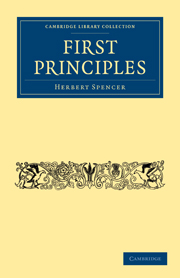IV - THE RELATIVITY OF ALL KNOWLEDGE
Published online by Cambridge University Press: 29 August 2010
Summary
§ 22. The same conclusion is thus arrived at, from whichever point we set out. If, respecting the origin and nature of things, we make some assumption, we find that through an inexorable logic it inevitably commits us to alternative impossibilities of thought; and this holds true of every assumption that can be imagined. If, contrariwise, we make no assumption, but set out from the sensible properties of surrounding objects, and, ascertaining their special laws of dependence, go on to merge these in laws more and more general, until we bring them all under some most general laws; we still find ourselves as far as ever from knowing what it is which manifests these properties to us: clearly as we seem to know it, our apparent knowledge proves on examination to be utterly irreconcilable with itself. Ultimate religious ideas and ultimate scientific ideas, alike turn out to be merely symbols of the actual, not cognitions of it.
The conviction, so reached, that human intelligence is incapable of absolute knowledge, is one that has been slowly gaining ground as civilization has advanced. Each new ontological theory, from time to time propounded in lieu of previous ones shown to be untenable, has been followed by a new criticism leading to a new scepticism.
- Type
- Chapter
- Information
- First Principles , pp. 68 - 97Publisher: Cambridge University PressPrint publication year: 2009First published in: 1862



